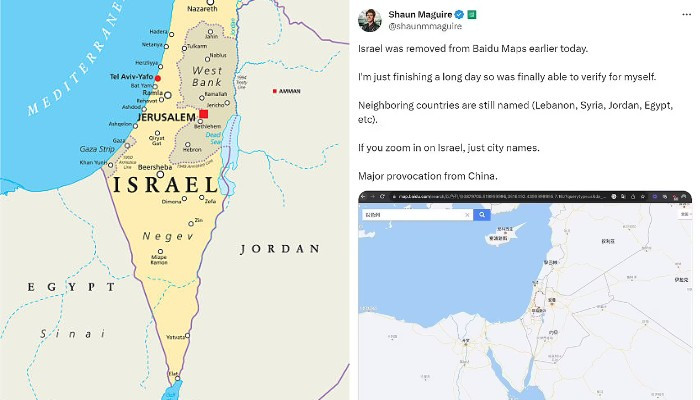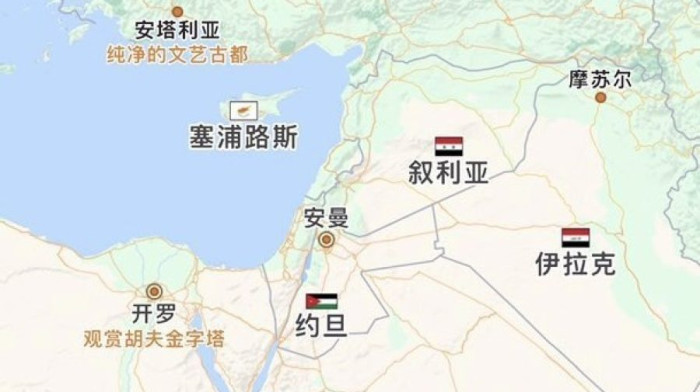Chinese companies purge Israel from maps of the Middle East
 Chinese tech giants Baidu and Alibaba no longer display the name of Israel on their maps, The Wall Street Journal reported on Monday - a move they said reflected 'Beijing's vague diplomacy in the region.' The online maps show Israel's borders and cities, the paper said. But the country itself is not named - in contrast to other neighboring countries. Social media users shared maps they said confirmed the WSJ's point. Jonathan Cheng, the WSJ's China bureau chief, tweeted: 'Chinese internet users expressed bewilderment that the name 'Israel' doesn't appear on digital maps from Baidu and Alibaba, an ambiguity that matches Beijing's vague diplomacy and contrasts with its general attentiveness to maps.' Antisemitism is surging online in China, The New York Times reported. A Chinese state broadcaster recently hosted a discussion page on Weibo stating that Jews controlled a disproportionate amount of U.S. wealth, the paper said. 'If China felt that it was dangerous and problematic to allow antisemitic comments to flourish, the censors would stop it. Clearly, the government is conveying the message that it's tolerated,' said Carice Witte, the executive director of SIGNAL Group, an Israeli think tank focusing on China. Russia and China on Wednesday vetoed a U.S. push for the United Nations Security Council to act on the Israel-Hamas conflict by calling for pauses in fighting to allow humanitarian aid access, the protection of civilians and a stop to arming Hamas and other militants in the Gaza Strip. China vetoed the resolution because they wanted to call for a ceasefire - something the United States refused to do. 'The draft does not reflect the world's strongest calls for a ceasefire, an end to the fighting, and it does not help resolve the issue,' China's U.N. Ambassador Zhang Jun told the council after the vote. 'At this moment, ceasefire is not just a diplomatic term. It means the life and death of many civilians.' On Monday, the commissioner-general of the U.N. agency known as UNRWA said there is no safe place anywhere in Gaza, warning that basic services are crumbling, medicine, food, water and fuel are running out, and the streets 'have started overflowing with sewage, which will cause a massive health hazard very soon.' U.S. Ambassador Linda Thomas-Greenfield urged the divided Security Council - which has rejected four resolutions that would have responded to the October 7 Hamas attacks and the ongoing war - to come together, saying 'the humanitarian crisis in Gaza is growing more dire by the day.' Stressing that all innocent civilians must be protected, she said the council must call 'for the immediate and unconditional release of all hostages, address the immense humanitarian needs of Palestinian civilians in Gaza, affirm Israel's right to defend itself from terrorism, and remind all actors that international humanitarian law must be respected.' She reiterated President Joe Biden's calls for humanitarian pauses to get hostages out and allow aid in, and for safe passage for civilians. But she would not accept the demand for a ceasefire - although the difference between a 'humanitarian pause' and a 'ceasefire' remains ambiguous. In a sign of increasing U.S. concern at the escalating Palestinian death toll, Thomas-Greenfield told the council Biden reiterated to Israeli Prime Minister Benjamin Netanyahu on Sunday 'that while Israel has the right and responsibility to defend its citizens from terrorism, it must do so in a manner consistent with international humanitarian law.' 'The fact that Hamas operates within and under the cover of civilians areas creates an added burden for Israel, but it does not lessen its responsibility to distinguish between terrorists and innocent civilians,' she stressed. Following the rejection of the four resolutions in the 15-member Security Council - one vetoed by the U.S., one vetoed by Russia and China, and two for failing to get the minimum nine 'yes' votes - Arab nations went to the U.N. General Assembly last Friday where there are no vetoes. The 193-member world body adopted a resolution calling for humanitarian truces leading to a cessation of hostilities by a vote of 120-14 with 45 abstentions. Now, the 10 elected members in the 15-member Security Council are trying again to negotiate a resolution that won't be rejected. While council resolutions are legally binding, assembly resolutions are not - though they are an important barometer of world opinion. Israel's U.N. Ambassador Gilad Erdan was sharply critical of the council's failure to condemn Hamas' attacks and asked members: 'Why are the humanitarian needs of Gazans, the sole issue, the sole issue you are focused on?'  |

EU plans crypto ban for Russia, FT reports
70911.02.2026, 00:48
US Treasury Secretary says US sanctions crushed Iran’s economy and sparked protests (video)
83306.02.2026, 10:43
Elon Musk just became the first person ever worth $800 billion after SpaceX acquired xAI
77804.02.2026, 18:30
Xi Jinping calls for China’s renminbi to attain global reserve currency status
73801.02.2026, 23:05
Trump signs order allowing US to impose tariffs on countries supplying oil to Cuba
78630.01.2026, 12:17
EU Adds Russia to High-Risk Money Laundering List Strengthening Financial Controls
82730.01.2026, 00:37
